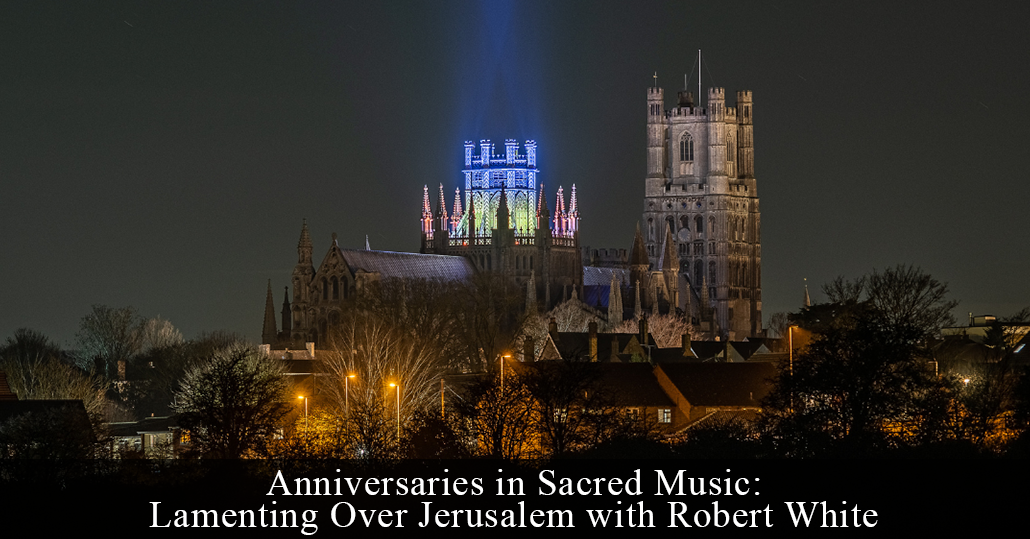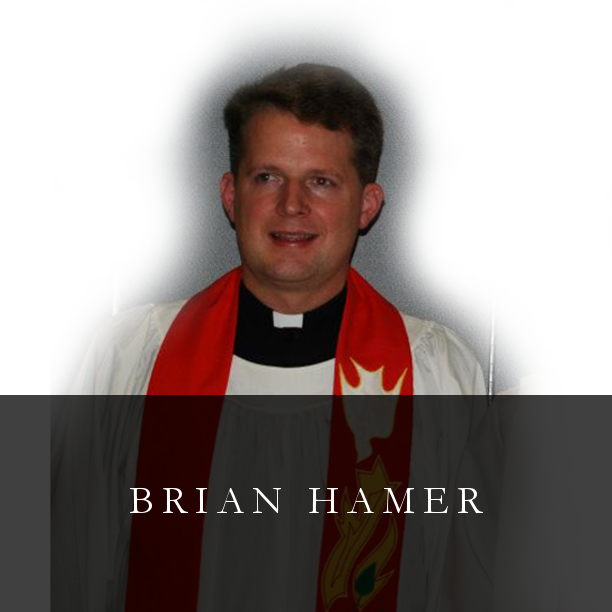When shall my sorrows have an end? Thy joys, when shall I see?
– Sixteenth-century Hymn
White was a Roman Catholic composer in England, often mentioned in the same breath with John Sheppard, Christopher Tye (whose daughter he married), Thomas Tallis, Robert Parsons, and Gyles Farnaby. He served three major posts as church musician: Ely Cathedral (please see the image above), Chester Cathedral, and Westminster Abbey. Choral works by White that are fitting for Lutheran worship include several settings of the Mass, Latin motets (including two settings of Lamentations, one for five voices and one for six voices), and about half a dozen English anthems. David Mateer and Irwin Spector describe his two sets of Lamentations as “particularly fine” and “a high point of Elizabethan choral music” (Grove Music Online).
The context for singing the Lamentations is Matins for the Triduum, that is, the three-day liturgy that encompasses Maundy Thursday evening through the dawn of Easter Sunday. Deeply penitential in nature, you can see as you survey the biblical verses below the video link how the strength of the law permeates Jeremiah’s message. Writing in Hebrew strophes (similar to hymn stanzas), the prophet looks ahead to Babylonian captivity and the desolation of Jerusalem. She had sinned grievously and become filthy (v. 8), was bound for a dramatic fall (v. 9), was susceptible to the enemy from Babylon (v. 10), and would soon trade earthly treasures for food (v. 11). These verses recall the Good Friday reproaches (improperia), wherein the voice of Christ, spoken by the pastor, calls God’s people to repentance:
Thus says the Lord:
"What have I done to you, O my people,
And wherein have I offended you?
Answer me.
For I have raised you up out of the prison house of sin and death,
"And you have delivered up your Redeemer to be scourged.
For I have redeemed you from the house of bondage,
And you have nailed your Savior to the cross.
O my people!"
Congregation:
Holy Lord God,
Holy and mighty God,
Holy and most merciful Redeemer;
God eternal, leave us not to bitter death.
O Lord, have mercy!
At verse 12, however, the text shifts to the voice of Christ, “All who you pass by [O vos omnes] look and see if there is any sorrow like my sorrow.” These words foreshadow the voice of Christ from the cross, as He suffered outside old Jerusalem and inaugurated the era of the new Jerusalem. The final verse of this setting continues the lament from the cross, so that these verses naturally lead the hearer from the service of foot-washing on Maundy Thursday to the veneration of the cross on Good Friday and into a period of waiting in quiet faith at the Easter Vigil, anticipating the news of Jesus’ resurrection.
As with most motets of this period, the biblical verses are set to imitative music, with each voice equal in importance and the music changing as the text changes. So far this is conventional for the high Renaissance. But there is a unique feature to White’s setting Lamentations that give it an enduring quality beyond some motets of this era. The verses below are acrostic, that is, each verse starts with a sequential letter of the Hebrew alphabet (Heth, Teth, Iod, etc.). These literary markers are probably not intended to be set to music, but some Renaissance composers included them. Peter Phillips summarizes the effect:
| | Where the Lament itself has the kind of immediacy which can sustain the use of dissonant harmony and word-painting, the Letters come over by comparison like an illuminated initial in a medieval manuscript, colourful against the black certainties of the script. – Liner notes to Gimell CD 289 454 996-2, p. 3 |
I hesitate to offer a track of nearly twenty-minutes of music in Latin, but you might find yourself immersed in the music and the message as you follow along with the text and let White be your musical and expressive guide. After listening to this work, you might agree with one scholar who placed it “among the most remarkable works bequeathed to us by an English composer of the 16th century” (The Musical Times 67:1004, p. 894).
Jerusalem sinned grievously;
therefore she became filthy;
all who honored her despise her,
for they have seen her nakedness;
she herself groans
and turns her face away.
TETH
9 Her uncleanness was in her skirts;
she took no thought of her future;
therefore her fall is terrible;
she has no comforter.
“O Lord, behold my affliction,
for the enemy has triumphed!”
IOD
10 The enemy has stretched out his hands
over all her precious things;
for she has seen the nations
enter her sanctuary,
those whom you forbade
to enter your congregation.
Jerusalem, Jerusalem, turn to the Lord, your God.
CAPH
11 All her people groan
as they search for bread;
they trade their treasures for food
to revive their strength.
“Look, O Lord, and see,
for I am despised.”
LAMED
12 “Is it nothing to you, all you who pass by?
Look and see
if there is any sorrow like my sorrow,
which was brought upon me,
which the Lord inflicted
on the day of his fierce anger.
MEM
13 “From on high he sent fire;
into my bones he made it descend;
he spread a net for my feet;
he turned me back;
he has left me stunned,
faint all the day long.
Jerusalem, Jerusalem, turn to the Lord, your God.
| | 37 “O Jerusalem, Jerusalem, the city that kills the prophets and stones those who are sent to it! How often would I have gathered your children together as a hen gathers her brood under her wings, and you were not willing! 38 See, your house is left to you desolate. 39 For I tell you, you will not see me again, until you say, ‘Blessed is he who comes in the name of the Lord.’” |
| | 2And I saw the holy city, new Jerusalem, coming down out of heaven from God, prepared as a bride adorned for her husband. 3 And I heard a loud voice from the throne saying, “Behold, the dwelling place of God is with man. He will dwell with them, and they will be his people, and God himself will be with them as their God. 4 He will wipe away every tear from their eyes, and death shall be no more, neither shall there be mourning, nor crying, nor pain anymore, for the former things have passed away.” |
Apostles, martyrs, prophets, there
Around my Savior stand;
And soon my friends in Christ below
Will join the glorious band.
O Christ, do thou my soul prepare
For that bright home of love
That I may see Thee and adore
With all Thy saints above. – LSB 673.5-6



 RSS Feed
RSS Feed
